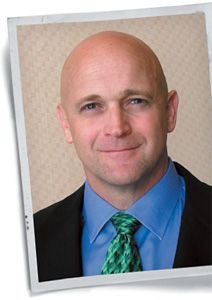When sports chiropractors first appeared at the Olympic Games in the 1980s, it was alongside individual athletes who had experienced the benefits of chiropractic care in their training and recovery processes at home. Fast forward to Paris 2024, where chiropractic care was available in the polyclinic for all athletes, and the attitude has now evolved to recognize that “every athlete deserves access to sports chiropractic."
U.S. Navy Names DC to Musculoskeletal Board
William Morgan, DC, has been appointed to the United States Navy's Musculoskeletal Continuum of Care Advisory Board (MCCAB), an entity created to address the prevalent musculoskeletal injuries sustained by U.S. armed forces personnel during active-duty operations. Dr. Morgan, who also serves on the spine subcommittee within MCCAB - members of which include orthopedic surgeons, sports medicine physicians, physical medicine and rehabilitation physicians and physical therapists - will serve as the sole chiropractic representative to MCCAB, the Bureau of Medicine and Surgery (BUMED) and the U.S. Navy. The spine committee will develop care algorithms for treating musculoskeletal and spinal conditions and in so doing, help determine the future of musculoskeletal management in the U.S. armed forces.
Addressing Musculoskeletal Health Issues in the Armed Forces
The leading cause of medical evacuation from forward-deployed units is musculoskeletal complaints, not combat wounds, with a high percentage of the complaints being back and neck pain. The MCCAB intends to develop guidelines for best practices in the management of musculoskeletal conditions through collaboration between professions, standardized metrics/outcome measurements, evidence-based practices and increased access to care.

This is a big step for chiropractic in the armed forces. Never before has a chiropractor been on a military medical board that will have this level of strategic planning and implementation of ideas. This advisory board will make decisions about the future direction of health care within the Navy and the Marine Corps (the Navy provides the medical care for both the Navy and the Marines). The development of the board and Dr. Morgan's appointment to it suggests the Navy's open-mindedness in addressing the need for better management of musculoskeletal conditions.
Dr. Morgan's Long Journey With Navy Health Care
Dr. Morgan has a long history in Navy medicine. Joining the Navy at age 17, he became a hospital corpsman, serving with Marine Corps Infantry and an elite Marine Recon Company. While in the Navy he was qualified in parachuting, military diving, submarine insertion, jungle warfare, combat swimming, explosives, mountaineering, winter warfare, and Arctic survival. He attended anti-terrorist training at the FBI academy. During a deployment to Southeast Asia, Morgan's unit assisted in the rescue of Vietnamese refugees, whose ship had been attacked by pirates. Morgan provided medical care to the refugees.
After leaving active military service, Morgan began college and transferred to the Navy reserves. He served briefly with a dive and salvage unit and was one of the Navy divers who helped raise the USS Potomac from the San Francisco Bay after she sank in 1980. In 1982, Morgan transferred to a reserve Naval Special Warfare platoon as the unit's primary hospital corpsman. He was sent to Special Operations Technician training, Coronado, Calif., to learn the principles and practice of dive medicine. For the next eight years he served as a dive medicine corpsman / combat swimmer for a platoon of Navy frogmen in Navy Special Warfare Unit One. (Dr. Morgan is quick to point out that while he served as an operator within a reserve SEAL platoon, his special warfare training took place in Marine Recon, not Navy BUDS.)
Dr. Morgan graduated from Palmer West in 1985 and practiced in California for 13 years. During that time, he pioneered chiropractic care within hospitals. He was credentialed and worked in two hospitals in central California. In 1998, after responding to an advertisement in Dynamic Chiropractic, he accepted a position at the Navy's premier medical center, National Naval Medical Center (NNMC), Bethesda, Md.
Dr. Morgan has practiced in Bethesda for the past 13 years and works in Navy-supported executive health clinics in the Washington, D.C. region, caring for service members, high-level civilian government leaders, as well as Pentagon leadership. On occasion, Dr. Morgan will make "house calls" or travel with government officials.
While representing chiropractic to the command, Morgan has given scores of lectures to the medical staff. He also lectures on a regular basis to medical residencies and fellowships, and has worked as a consultant to the Veterans Administration and the U.S. Army. He is on faculty at the Uniformed Services University of Health Sciences' Medical School, a professor for New York Chiropractic College, and has worked as adjunct faculty for Cleveland Chiropractic College, Palmer College, National University of Health Sciences and Texas Chiropractic College.
NNMC has been a model for chiropractic internships and fellowships. Fellow NNMC chiropractor Terence Kearney and Dr. Morgan have mentored dozens of chiropractic students over the past 11 years. Dr. Morgan is also the chiropractor for the U.S. Naval Academy's football team. With his two sons serving in the U.S. military, Dr. Morgan has a strong incentive to ensure that military medicine provides its members with the best care in the world. He has a vision for chiropractic; he likes to say that "military chiropractors are the hands of a grateful nation."


